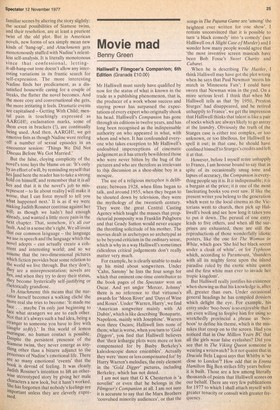Movie mad
Benny Green
Halliwell's Filmgoer's Companion; 6th Edition (Granada £10.00) Mr Halliwell must surely have qualified by now for the status of what is known in the trade as a publishing phenomenon, that is, the producer of a work whose success and staying power has surpassed the expectations of every expert who originally shook his head. Halliwell's Companion has gone through six editions in twelve years, and has long been recognised as the indispensable authority on who appeared in what, with whom and when. It has confounded everyone who takes exception to Mr Halliwell's undoubted imperceptions of cinematic judgement as it has utterly bewildered those who were never bitten by the bug of the pictures and who are therefore as irrelevant to this discussion as a shoe-shine boy in a mosque. The use of a religious metaphor is delib erate; between 1928, when films began to talk, and around 1955, when they began to be shouted down by television, they were the mythology of the twentieth century. They were the great Central Casting Agency which taught the masses that proprietorial pomposity was Franklin Pabgborn and that Grady Sutton would never escape the throttling solicitude of his mother. The movies dealt in archetypes so archetypal as to be beyond criticism in the ordinary sense, which is why in a way. Halliwell's sometimes ridiculous critical judgements don't really matter very much.
For example, he is clearly unable to make up his mind about songwriters, Under 'Cahn, Sammy' he lists the four songs for which that eminent one-time contributor to the book pages of the Spectator won an Oscar. And yet under 'Mercer, Johnny' there is no reference to that virtuoso's awards for 'Moon River' and 'Days of Wine and Roses'. Under 'Warren, Harry', we find 'American songwriter mainly with Al Dubin', which is like describing 'Bonaparte, Napoleon, mainly with Josephine'. Warren won three Oscars; Halliwell lists none of them; what is worse, when you turn to 'Gold Diggers', you find that Halliwell believes that 'their lethargic plots were more or less compensated for by Busby Berkeley's kaleidoscopic dance ens-embles'. Actually they were 'more or less compensated for' by Harry Warren's melodies, the only element in the 'Gold Digger' pictures, including Berkeley, which has not dated.
I am not sure that G K Chesterton is 'a novelist' or even that he belongs in the Filmgoer's Companion at all. I am not sure it is accurate to say that the Marx Brothers 'convulsed minority audiences', or that the songs in The Pajama Game are 'among' the brightest ever written for one show'. I remain unconvinced that it is possible to turn 'a black comedy' into 'a comedy' (see Halliwell on A Slight Case of Murder) and I wonder how many people would agree that 'the most inventive screen musicals have been Bob Fosse's Sweet Charity and Cabaret.
When he is describing The Hustler, I think Halliwell may have got the plot wrong when he says that Paul Newman 'meets his match in Minnesota Fats'; I could have sworn that Newman wins in the end. On a more serious level. I think that when Mr Halliwell tells us that 'by 1950, Preston Sturges' had disappeared, and he retired unhappily to France', we get the impression that Halliwell thinks that talent is like a pair of socks which are always likely to go astray at the laundry. Obviously the truth of the Sturges case is either too complex, or too unknown, or too libellous, for Halliwell to spell it out; in that case, he should have confined himself to Sturges's credits and left it at that.
However, before I myself retire unhappily to France, I am honour bound to say that in spite of its occasionally smug tone and lapses of accuracy, the Companion is everything people say it is. It is indispensable; it is 'a bargain at the price; it is one of the most 'fascinating books you ever saw. If like the present writer you belong to the generation which went to the local cinema as the Victorians went to church, then pick up Halliwell's book and see how long it takes you to put it down. The perusal of one entry leads to five others, and when all the surprises are exhausted, there are still the reproductions of those wonderfully idiotic posters, like the one for The Woman in White, which goes 'She hid her black secret under a cloak of white', or for Typhoon which, according to Paramount, 'thunders with all its mighty force upon the island paradise ruled by the exotic white queen and the first white man ever to invade her tropic kingdom'.
But Halliwell really justifies his existence when showing us that his knowledge is, after all, greater than ours. Under occasional general headings he has compiled dossiers which delight the eye. For example, his entry under 'boo-boos' is so enjoyable that I am even willing to forgive him for using so wretchedly provincial a phrase as 'booboos' to define his theme, which is the mistakes that creep on to the screen. Had you noticed that in One Million Years BC that all the girls wear false eyelashes? Did you see that in The Viking Queen someone is wearing a wristwatch? Is it not quaint that in Dracula Bela Lugosi says that Whitby is ''so close to London'? How odd that in Emma Hamilton Big Ben strikes fifty years before it is built. Those are a few among literally thousands of points that Halliwell scores on our behalf. There are very few publications for 1977 to which I shall attach myself with greater tenacity or consult with greater frequency.


































 Previous page
Previous page